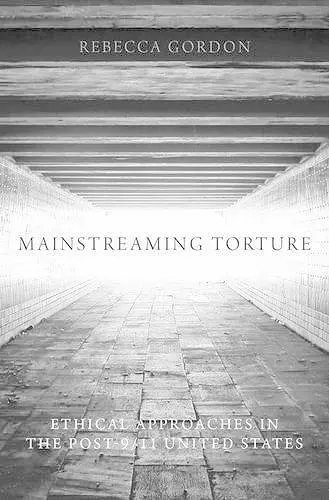Mainstreaming Torture
Ethical Approaches in the Post-9/11 United States
Format:Hardback
Publisher:Oxford University Press Inc
Published:22nd May '14
Currently unavailable, and unfortunately no date known when it will be back

The terrorist attacks of September 11, 2001 reopened what many people in America had long assumed was a settled ethical question: Is torture ever morally permissible? Within days, some began to suggest that, in these new circumstances, the new answer was yes. Rebecca Gordon argues that September 11 did not, as some have said, change everything, and that institutionalized state torture remains as wrong today as it was on the day before those terrible attacks. Furthermore, U.S. practices during the war on terror are rooted in a history that began long before September 11, a history that includes both support for torture regimes abroad and the use of torture in American jails and prisons.The terrorist attacks of September 11, 2001 reopened what Gordon argues that the most common ethical approaches to tortureutilitarianism and deontology (ethics based on adherence to duty)do not provide sufficient theoretical purchase on the problem. Both approaches treat torture as a series of isolated actions that arise in moments of extremity, rather than as an ongoing, historically and socially embedded practice. She advocates instead a virtue ethics approach, based in part on the work of Alasdair MacIntyre. Such an approach better illumines tortures ethical dimensions, taking into account the implications of torture for human virtue and flourishing. An examination of torture's effect on the four cardinal virtuescourage, temperance, justice, and prudence (or practical reason)suggests specific ways in which each of these are deformed in a society that countenances torture.many people in America had long assumed was a settled Mainstreaming Torture concludes with the observation that if the United States is to come to terms with its involvement in institutionalized state torture, there must be a full and official accounting of what has been done, and those responsible at the highest levels must be held accountable.
The book will be useful for contexts in which readers are interested in seeing how relevant Christian teaching and abstract political theory can be ti institutional life and practical politics today. * George R. Wilkes, Expository Times *
This remarkable morally and politically challenging and courageous work confronts unblinkingly the profoundly disturbing truth that both popular and scholarly discourses in America consistently distort and sanitize the essential nature of the torture that has become a socially embedded practice in our country. If you care about our national character, consider these insightful and telling analyses and demand an appropriate accounting from our political leaders. * Henry Shue, University of Oxford *
We would rather avoid facing the reality of torture. In this book, Gordon shows us that our primary ways of thinking about torture are in fact ways of avoiding the full reality of it. Arguments for and against torture treat it as isolated acts by individuals, but Gordon shows that torture is embedded in a system of social practices with a set of moral habits which are in many ways fostered by society as a whole. This is a well-researched, well-argued, and disturbing book. * William T. Cavanaugh, DePaul University *
Torture by our U.S. military and spies is not new. Nor is it the result of a few bad apples. Gordon documents the systematic teaching and use of torture by the U.S. since Vietnam. This excellent book challenges us to end torture. Not only by prosecuting the front line people who get caught, but also going after the high-ranking public officials who are tortures intellectual authors. * Bill Quigley, University of New Orleans *
ISBN: 9780199336432
Dimensions: 163mm x 236mm x 25mm
Weight: 431g
240 pages